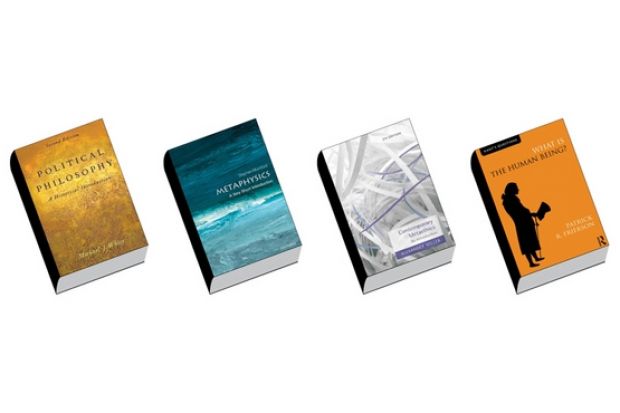Do we need philosophy textbooks? Surely philosophy is less something you learn than something you do. But you do it in company, rather than alone, and to join the philosophical conversation you need a grasp of 2,600 years’ worth of posing, answering and rebutting questions, as well as specific logical and argumentative skills. There was virtually no student-oriented background material in philosophy while its teaching was confined to university, but since the introduction in 1986 of A-level philosophy there has been an avalanche of the stuff. Is it actually helpful?
In the latest spate of new titles, the best is not really a textbook at all: Michael White’s erudite, entertaining Political Philosophy: An Historical Introduction. It is not a comprehensive survey but rather a selective examination of theories from Plato to Rawls, and the way these have been informed by changing assumptions about what we are and how we should live. White emphasises that as well as doing “normative anthropology”, he is telling a story. With the dexterity of a great novelist, he creates a vivid narrative of liberalism’s development – one so gripping I stayed up all night to read it. Students can feel challenged yet secure, and learn about gnosticism, Arianism and the Whigs en passant.
Papineau’s Philosophical Devices: Proofs, Probabilities, Possibilities, and Sets is equally exemplary. All the content that a year or two of reluctantly attended logic classes might try to instil – or at least the choicest morsels – are enjoyably conveyed in under 200 pages, including well-designed exercises. The author lucidly outlines concepts that are often never made explicit to students – a prioricity, modality, set theory – and gracefully pinpoints confusions and distinctions between subjective and objective probability, causation and correlation, and types of truth. As with all the best ideas, you wonder why this sort of book has not been written before.
Mumford’s Metaphysics (in Oxford University Press’ Very Short Introduction series) deliberately avoids the technical, since it is aimed at general readers as well as students. It manages to be jargon-free without sacrificing rigour and complexity, but I cannot see why readers should not be treated to technical concepts as well, perhaps inserted after the informal chapter titles – “What is a table? (substance and properties)”, for instance. Balancing the scholarly and accessible is tricky. To my taste, Miller’s Contemporary Metaethics: An Introduction veers too far to the first extreme (too much F-ness, too many C-conditions), Effingham’s An Introduction to Ontology to the second, whereas What Is this Thing Called Philosophy of Language? (Kemp) gets it just right. It clearly expounds the theories in philosophy of language, and their merits, rebuttals and developments. Each chapter ends with a summary, some study questions and “Historical notes” that delineate how the key philosophers mentioned have influenced the debate, thus enabling students to appreciate the theories, not just in relation to the potentially timeless truth of what they say but as part of the historical conversation in time.
Essays in The Bloomsbury Companion to Continental Philosophy (Mullarkey and Lord) are certainly not for A-level students and are often hard work. Refreshingly, however, they treat continental philosophy not in the usual way, as self-enclosed, but as an ongoing enterprise, integrated with naturalism and Anglo-American analytic philosophy. Husserl’s phenomenology is linked to cognitive science and enactivism; evolutionary theory’s take on empathy is examined alongside Levinas’. A glossary summarises topics and thinkers (I was thrilled finally to sort out “hermeneutics”) and a timeline charts philosophical, political, scientific and artistic events from 1750 to 2000. Gallagher’s Phenomenology is also adept at avoiding conceptual quagmires and connecting Mitsein and transcendental intersubjectivity to rigorous empirical research in psychology.
There are useful collections of readings on the latest contributions to debates about free will and about ethical theory, including What Is the Human Being? (Frierson) and Twelve Theories of Human Nature (Stevenson et al). Both are scholarly, provocative books on philosophical treatments of human nature (the former part of an interesting new range of books developing Kantian themes).
The best of these books are not too textbook-like, and expect (and therefore will probably get) interest and intelligence from their readers. Others, though, seem to assume that students are stupid and bored, needing constant cajoling. In Velasquez’s Philosophy: A Text with Readings, Van Camp’s Ethics and Parvin and Chambers’ Political Philosophy: A Complete Introduction, the text is typically broken up with glossy photos, boxed-off “key points”, “connections”, “spotlights” or “case studies”, with “critical thinking” questions perched in the margin (what was the student supposed to be doing the rest of the time?). All this kerfuffle is not only superfluous but distracting, and destructive of the “thinking for yourself” that it so vehemently exhorts students to do. Instead of the calm, fluent scholarship of White, Mumford or Papineau, which infectiously luxuriates in the joy of philosophy, there is the restless anxiety of regurgitating mother birds that believe their chicks need everything predigested. Paradoxically, trying to avoid authoritative erudition can result in authoritarian emptiness, in precisely the directive, moralising rote-learning that the student-friendly approach was designed to destroy. As White puts it in his superb Political Philosophy: “There is no better way of learning how to ‘do philosophy’ than by critically examining the way it has been done by others whose excellence in the enterprise has been long recognized.”
Tap and scroll down for links to all Philosophy textbooks
Or view PDF below
Register to continue
Why register?
- Registration is free and only takes a moment
- Once registered, you can read 3 articles a month
- Sign up for our newsletter
Subscribe
Or subscribe for unlimited access to:
- Unlimited access to news, views, insights & reviews
- Digital editions
- Digital access to THE’s university and college rankings analysis
Already registered or a current subscriber?
